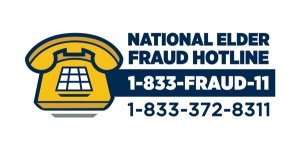Press Release
U.S. Attorney's Office Partners with New Hanover County Senior Resource Center and Wake County Meals on Wheels to Empower Older Veterans
For Immediate Release
U.S. Attorney's Office, Eastern District of North Carolina
The U.S. Attorney’s Office for the Eastern District of North Carolina promotes the Department of Justice’s (DOJ) Elder Justice Initiative (EJI) throughout the New Hanover and Wake County areas. On November 1, 2019, the Eastern District partnered with New Hanover County Senior Resource Center and Wake County Meals on Wheels to initiate outreach to approximately 1,750 seniors to provide facts about Older Veteran elder abuse.
Below are some facts shared with the community about elder abuse of older Veterans:
- Older Veterans may be at risk for elder abuse
- Almost 10 million Veterans are 65 or older. National studies find that older adults are victims of elder abuse annually.
- Family members and caretakers may encourage or force older Veterans to take drugs or drink excessively to make them “easier” to care for or exploit financially.
- Veterans who have poor relationships with their families may not receive adequate care by these family members.
- Veterans who receive Veteran benefits such as VA pension, VA Compensation per VBA, or Aid and Attendance can be at risk for financial abuse.
- Warning Signs by Type of Abuse
- Physical Abuse
- Bruises, black eyes, welts, lacerations, or rope marks
- Broken eyeglasses
- Medication overdose or under-utilization of prescribed drugs
- A sudden change in behavior
- Psychological Abuse
- Being emotionally upset, agitated, withdrawn, non-communicative, or non-responsive
- Unusual behavior such as sucking, biting, or rocking
- The caregiver’s refusal to allow visitors to an older Veteran alone
- Apologizing excessively
- Sexual Abuse
- Bruises around the breast or genital area
- Unexplained venereal disease or genital infections
- Showing fear or becoming withdrawn when around a specific person
- Neglect and Abandonment
- Dehydration, malnutrition, untreated bed sores, and poor personal hygiene
- Unattended or untreated health problems
- Unsanitary, unclean, or unsafe living conditions
- The desertion of an older Veteran at a shopping center or other public location
- Financial Abuse
- Unexplained changes in bank accounts or banking practices
- Abrupt changes in a will or other financial documents
- Unexplained disappearance of funds or valuable possessions
- Sudden unexplained transfer of assets
- Physical Abuse
Report Financial Abuse or Fraud of an Older Veteran
- To report the misuse of a Veteran’s VA benefits, call 1-800-488-8244 or email VAOIGHotline@va.gov
- You may also contact the Veterans Benefits Administration at 1-800-827-1000 or VA Fiduciary Hub at 1-888-407-0144
- For assistance concerning VA Extended Care & Home Care fraud, email VHAPurchasedLTSSSupportGroup@va.gov
The mission of the Elder Justice Initiative is to support and coordinate DOJ’s enforcement and programmatic efforts to prevent and combat elder abuse, neglect, financial exploitation and scams that target our nation’s seniors by promoting justice for older adults; helping older victims and their families; enhancing state and local efforts through training and resources; and supporting research to improve elder abuse policy and practice.
For more information about DOJ’s efforts to prevent and combat elder abuse, please visit the Elder Justice Website at https://www.justice.gov/elderjustice. Elder fraud complaints may be filed with the FTC at www.ftccomplaintassistant.gov or at 877-FTC-HELP. You can also contact the Victim Connect Hotline between 9am-6pm, Monday through Friday, at: 1- 855-4VICTIM (1-855-4842846), or contact the Elder Justice Coordinator at the U.S. Attorney’s Office for the Eastern District of North Carolina at (919) 856-4530.
Updated November 1, 2019
Topic
Elder Justice
Component

 U.S. Department
of Justice
U.S. Department
of Justice
